Epistemic Luck, Angst and Disjunctivism
Interview with Richard Marshall.

Duncan Pritchard is a leading epistemologist. Here he discusses epistemic luck and anti-luck epistemology, neo-Moorean approaches, Pyrrhonian scepticism and how to live with scepticism, veretic luck, reflective luck, Wittgensteinian and McDowellian considerations, disjunctivism, epistemic angst, keeping apart underdetermination-based scepticism and closure-based radical scepticism, Wittgenstein on certainty and closure-based radical scepticism, Williamson's knowledge-first approach and how best to answer those who worry that philosophical questions can't ever be conclusively answered.
3:AM:What made you become a philosopher?
Duncan Pritchard:I must have been a very strange child, because from a very early age (6-7) I somehow formed the idea that I wanted to be a Professor. (I recall the teacher asking the class what we wanted to do when we grew up, and amidst all the usual answers⎯fireman, policewoman, train driver, and so on⎯there was my answer: ‘Professor’). This is particularly odd given that I don’t come from a background that would bring me into contact with Professors, or indeed even people with undergraduate degrees! In fact, I’m the first member of my family to go away to University (indeed, growing up I simply didn’t come into contact with people who were degree educated very much). I think I liked the idea that a Professor was as high as it went in terms of your knowledge of a subject. I may also have had some vague idea about a ‘life of the mind’, and why this might be attractive (e.g., reading lots of books, as I loved books). Of course, I didn’t know what subject I wanted to be a Professor of⎯that came later.
The way I got into Philosophy was pure luck. My original plan was to try to get into Oxford to study English Literature. But I was an unsophisticated and introverted boy (both are still true of me, alas) from a working-class background and at a mediocre state school, so my chances were pretty slim. But then a wonderful opportunity presented itself. A part-time job that I had (and which I loved) looking after a local graveyard (mainly cutting the grass, but yes, sometimes digging graves too) looked to be morphing into a more full-time temporary role. The graveyard was very large, and in the middle of a very deprived area of Wolverhampton, near to where I grew up. Working part-time, I could only keep on top of some of the graveyard; the rest was completely overgrown. But the plan was to spend a year getting the whole graveyard under control, and of course once the jungle had been cut back it would be easier to maintain. The thinking was that this would be good for the area, and of course I was just the person to do it. This was going to solve lots of problems for me. I could take a year out and earn a decent wage, enough to finance a trip aboard at the end to do some travelling and make myself a little less unsophisticated. Plus, by taking a year out I could potentially get admitted to Oxford on grades alone, without having to do the interview (which I was dreading, as unlike pupils from private schools I would get absolutely no preparation). So far so good. But then the recession hit Wolverhampton.
The factory where my father worked laid off most of its workers, him included, and my mother also lost her job as a school secretary. Worse, the funding for my position was starting to look precarious as well, so I was now looking at a year at home with me and my parents all out of work (on the ‘rock and role’, as we called it, which is the rhyming slang for ‘dole’ money—the state assistance for the unemployed). (I got the grades I wanted by the way, and then some, as I took the so-called ‘special level’ exams for my subjects too⎯these were the old Oxbridge entrance papers, and to my knowledge I was the first person to take them at my school, at least as anyone could remember anyway⎯and I sailed through them as well. But all for naught as it turned out). In any case, I was now facing a crisis. Could I really face living a year in Wolverhampton with my parents and all of us on the dole (much as I love Wolverhampton⎯it’s one of the friendliest places around, for example⎯it is rather grey and depressing, particularly back then)? Anyway, then I remembered that our school had advised people to apply for University places even if they intended to take a year out, as one could always decline their place. Since I had no intention of going to University that year, I therefore had randomly chosen five northern Universities, and ‘accepted’ the one that replied first, thinking that I would never go there. That turned out to be the University of Hull, and as it happened this was the only place where I had applied to do Philosophy and English Literature as a joint degree rather than just English Literature. So I was now faced with the prospect of a bleak year in Wolverhampton, or actually taking up this place at Hull.
I thought about it for a while, and decided to give it a shot. It was an excellent decision. First, because Hull turned out to be an amazing place. It’s a bit like Wolverhampton in fact, in that it is very friendly and unappreciated. But also because I was introduced to philosophy and realised that this was what I was born to do. Yes, I love literature, but what really gets me going is ideas, and I realised that it is the ideas in the literature that draw me in. By the end of the first year I converted to a single honours degree in Philosophy, and never looked back. (Mind you, back then I was a ‘continental’ philosopher, reading lots of Foucault, Deleuze, Marx, Nietzsche, Heidegger and so on. I’m still interested in some of these figures as it happens, particularly Heidegger and Nietzsche, but these days I’m very much in the analytical mould). I thrived at Hull, and not just academically, as I also got to do other interesting things, such as be the editor of the University newspaper, The Hullfire. In my final year I asked my dissertation supervisor, a very nice chap called T. S. Champlin, who the best analytical philosopher currently working in the UK was (the idea of going abroad never even occurred to me), and he said ‘Crispin Wright’. So I started reading Wright’s work, which was an eye-opener for me (especially as it was only in the second half of my degree that I really started to become converted to analytic philosophy). Suitably impressed, I applied to the University of St. Andrews, specifically to do my PhD under Crispin’s supervision (which was an excellent call).
By the way, there’s a postscript to all this that I should mention, not least because it might encourage someone out there to give professional philosophy a shot who might otherwise give it a wide berth. Given my modest background, and in particular the fact that I had absolutely no independent financial means (I worked my way through University), opting for a subject like philosophy was a hell of a risk. Remember that I’m the first person from my family to go away to University (indeed, no-one I knew, even remotely, growing up had been to University)—I really should have opted for something with more job security! (Though being a poet—another ‘job’ I had also seriously considered at one point—is hardly better of course). But I reasoned that I owed it to myself to at least try it, and then further reasoned that if I was going to try it I had to go in 100%. I won’t lie: it was bloody difficult, and at one point had it not been for the financial help of a very kind (and generous) friend of mine, I would have had to quit. In retrospect I was very lucky to be doing a PhD around the time that British philosophy was starting to become more professional and meritorious (largely because of the RAE, now called the REF, that had been introduced to rate academic subject areas). This meant that no one really cared that much any more that I didn’t go to the right school or had the right background, but focused instead on what I had actually achieved. And I published early, and kept on publishing⎯that stood me in good stead, and it meant that I managed to get a decent (albeit temporary) academic position straight out of my PhD (cemented further by a grant I received from the Leverhulme Trust, which helped me write Epistemic Luck). Hard work, enthusiasm, and a general bloody-mindedness to refuse to even countenance the worst-case scenario (back to Wolverhampton with my tail between my legs?) did wonders for me back then (plus the good fortune that my first job was at the wonderfully supportive University of Stirling Department of Philosophy). And of course the fact that I ended up being paid to do philosophy was incredible to me, and still is, to be frank.
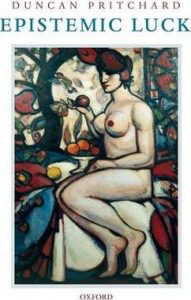
3:AM:You’re an epistemologist and think that looking at epistemic luck and anti-luck epistemology sheds light on a number of big philosophical issues. So to start with, what is epistemic luck and anti-luck epistemology?
DP:When I originally started thinking about anti-luck epistemology, I was treating it is as merely an idea for a paper! But I quickly realized that there is a whole methodology here. The basic idea is that if we really do treat the claim that knowledge excludes luck as a platitude, then it behooves us to (i) explain what luck is, and (ii) explain in what specific sense knowledge excludes luck (after all, there can be lucky knowledge, as in lucky discoveries). The thought was that once we put these two components together we would be in a position to elucidate what the anti-luck condition on knowledge amounted to. What made this task so difficult was the surprising fact that luck itself, despite being a core philosophical notion⎯one that appears in a whole range of philosophical debates, including ethics (e.g., moral luck), metaphysics (e.g., debates about causation and free will), and political theory (e.g., issues about just deserts)⎯was not itself defined. This is surprising precisely because analytical philosophers are notorious for wanting definitions of core terms, so it is odd that they were content to leave this particular core term as primitive. In any case, it turned out that developing an anti-luck epistemology meant developing a theory of luck, pretty much ex nihilo.
The proposal I ended up with was the modal account. Roughly, a lucky event is an event that actually obtains but where it’s not obtaining is an easy possibility—i.e., in close possible worlds it doesn’t obtain. That’s why a lottery win is lucky, in that you could very easily have lost (there are lots of close possible worlds where you lose). I argue that the core notion of epistemic luck that is incompatible with knowledge is veritic epistemic luck—where, given how one formed one’s belief, one’s belief is only luckily true. Putting this together with the modal account of luck, we get the idea that knowledge is incompatible with cognitive success (true belief) that could very easily have been cognitive failure (false belief). I argue that anti-luck epistemology not only gives us an independent rationale for the safety condition on knowledge, but also tells us how to understand that condition, which enables proponents of safety to respond to some problems that have been leveled at it. (For more on epistemic luck and anti-luck epistemology, see Epistemic Luck, (Oxford UP, 2005), and ‘Anti-Luck Epistemology and the Gettier Problem’, Philosophical Studies172 (2015), 93-111. For my most recent defence of the modal account of luck, see ‘The Modal Account of Luck’, Metaphilosophy45 (2014), 594-619).
There are actually lots of important nuances here⎯such as regarding the right way to understand the relevant modal condition on knowledge, the importance of keeping the basis for belief fixed, and so on⎯but this really isn’t the place to get into these details. I would like to mention one thing, however, which is that these days I talk about anti-risk epistemology rather than anti-luck epistemology. Risk and luck are closely related notions, but I argue that the differences, while subtle, are nonetheless significant. Moreover, I claim that an anti-risk epistemology has some important advantages over an anti-luck epistemology. (If you want to know more about anti-risk epistemology and how it differs from anti-luck epistemology, see ‘Epistemic Risk’, Journal of Philosophy113 (2016), 550-71. If you want to know more about the modal account of risk that underlies it, and how it relates to the modal account of luck, see ‘Risk’, Metaphilosophy46 (2015), 436-61).
By the way, one of the satisfying side-effects of having to offer a theory of luck in order to develop anti-luck epistemology is that there is now a whole philosophical literature on luck, with various competing accounts on offer besides my modal proposal.
3:AM:You reject safety-based neo-Moorean approaches to dispelling scepticism on the grounds that contemporary discussions misunderstand what the focus of scepticism is. Can you unpack this for us and say something about why examining ancient Pyrrhonian scepticalwritings helps us to understand where contemporary debates about scepticism have gone wrong? Why do you say that contemporary epistemology as a whole is in trouble and that examining the role of luck in knowledge reveals this?

DP:There are three very different questions in play here, so I will take them separately, and in turn.
At one point (see my book Epistemic Luck, (Oxford UP, 2005)) I tried to defend safety-based neo-Moorean approaches to scepticism, but I no longer find it plausible. The basic idea behind such proposals is that even if we lack rationally grounded knowledge of the denials of radical sceptical scenarios, we can still have knowledge of them in virtue of having safe beliefs in them (i.e., true beliefs that could not easily be false). This was in turn motivated in terms of a wider epistemic externalism, and some pragmatic theses regarding the propriety conditions for knowledge claims. But I think it was clear even from Epistemic Luck(which is shot-through with the boundless enthusiasm of a first monograph) that I wasn’t altogether convinced that this was the right way to go. In order to understand why, we need to talk about my more recent work on radical scepticism, as found especially in my most recent monograph Epistemic Angst(Princeton UP, 2015). I talk about the new monograph below, but the basic point that’s relevant for our purposes is that I think such a safety-based approach doesn’t really speak to the underlying motivations for radical scepticism, and hence cannot offer us any kind of philosophical satisfaction.
I think the Pyrrhoniansceptical challenge is completely different from the usual radical sceptical problem. The latter is, I claim, properly understood as a (putative) paradox—i.e., as putatively exposing deep tensions within our folk concepts, in this case within the epistemological realm. This is why I think it’s important to keep radical scepticism, qua position, distinct from radical scepticism, qua paradox. Even if it were true that there is no coherent philosophical position known as radical scepticism (e.g., the view that none of our beliefs have any epistemic standing whatsoever), this wouldn’t thereby offer us any purchase on the radical sceptical paradox. (Compare: suppose it is true—and for what it is worth I think it is true—that we can’t help but believe that we have free will. If that’s right, then there is no coherent position in the free will debate that involves denying that we have free will. But that hardly helps us resolve the problem of free will, much less does it show that we actually have any). To resolve the radical sceptical paradox, we either need an overriding, or revisionary, anti-sceptical strategy that discards some of our fundamental epistemic convictions, or—and I would argue preferably—we need an undercutting anti-sceptical strategy that demonstrates that what looks like a paradox is in fact nothing of the sort. It’s the latter that I offer in my new monograph, though, as I explain below, we first need to get a handle on exactly what the putative sceptical paradox amounts to. In any case, Pyrrhonian scepticism is not even attempting to offer a paradox. Indeed, it is precisely offering us a way of living our scepticism. This is why it’s important to keep it separate from the radical sceptical paradox. I plan to write more on Pyrrhonism in the next few years. Very roughly, my idea is that once we have resolved the radical sceptical paradox in the manner that I set out in Epistemic Angst, then we shouldn’t be so afraid of Pyrrhonism. In fact, right now I’m inclined to argue that there are moderate versions of Pyrrhonism that are compatible with the exercise of intellectual virtue, and hence are epistemically laudable.
On the last question, while I’m willing to grant that there are all kinds of problematic aspects of contemporary epistemology, I don’t see how they have much to do with epistemic luck. (Of course, there are specific epistemological theses that are in trouble if I’m right about epistemic luck, but that’s not the same as contemporary epistemology in general being in trouble).
3:AM: What does ‘veritic luck’ show us about the role of luck in knowledge?
DP:As I explain above, veritic epistemic luck is manifested when, given how one formed one’s belief, one’s belief is only luckily true. Knowledge is incompatible with veritic epistemic luck. Given the anti-luck epistemology described earlier, it follows that what this means is that knowledge entails a true belief that couldn’t very easily be false, given how it was formed. This is known as the safety condition, and it is one attractive feature of the methodology anti-luck epistemology that it offers us an independent way of motivating the safety condition over its rival modal epistemic conditions, such as sensitivity, in the sense that we are not simply evaluating the rival modal epistemic conditions purely in terms of how they deal with particular cases (as is the usual methodology). As I noted above, anti-luck epistemology also helps us to unpack the safety condition along particular lines.
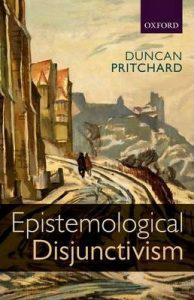
3:AM:What’s ‘reflective luck’ and its role in various virtue epistemic theories – what do the various approaches show us about the centrality of taking cognitive responsibility for one’s beliefs to knowledge?
DP:I introduced the notion of reflective epistemic luck in Epistemic Luckin order to explain how a true belief that is not objectively subject to epistemic luck could nonetheless be subjectively subject to epistemic luck. Remember that whether your true belief is lucky, on my view, ultimately depends on objective features of the actual world, since these determine what is happening in close possible worlds. This means that one can have a true belief that is in fact not veritically lucky, since the possible worlds where your belief-forming process leads to you to false beliefs are modally far-off, even though one lacks good reasons for thinking that the actual world is so constituted. (It’s important here that we are talking about reasons in non-factive terms, as was common at the time, but in later work—especially my monograph Epistemological Disjunctivism(Oxford UP 2012)—I argued that rational support, at least in the perceptual case anyway, is paradigmatically factive). In such a case one’s true belief would not be subject to veritic epistemic luck even though it would be subject to reflective epistemic luck. The thought was that in this way we can explain certain important intuitions. For example, it is widely held that one can’t know that one is not the victim of a radical sceptical hypothesis, such as being a brain-in-a-vat (BIV). But if this is in fact a modally far-fetched error-possibility, then potentially at least one’s belief that one is not a BIV is not subject to veritic epistemic luck.
At least, this was the line taken in Epistemic Luckanyway, as part of the safety-based neo-Moorean response to radical scepticism described above (and since disavowed). But it’s consistent with arguing that one has this epistemic standing for one’s belief that one is not a BIV that one lacks any good (non-factive) rational support for supposing that the BIV scenario is modally far-fetched. One’s true belief that one is not a BIV is thus subject to reflective epistemic luck. Hence we can, in principle anyway, explain why we think that we lack knowledge that we are not BIVs in terms of the fact that there is a kind of epistemic luck that we cannot exclude in this regard. The epistemic externalist move was then to argue that we should care about the objective features of our epistemic situation, rather than the subjective ones, and hence be willing to live with the phenomenon of reflective epistemic luck. That’s why I claimed that that while it would be preferable to have an epistemic standing that was not subject to reflective epistemic luck, nonetheless we could have knowledge regardless. As noted above, my position in this regard has changed substantially since Epistemic Luckcame out, so I’m here simply recounting a stance held by my previous self.
3:AM:How do Wittgensteinian and McDowellian considerations help us understand the role of luck in epistemology? Are you pessimistic about our ability to mount an anti-sceptical response to the role of luck? Doesn’t a pragmatic response really admit defeat?
DP:The real question here is how Wittgenstein and McDowell help us deal with the problem of radical scepticism, and I explore this issue below, as part of my ‘biscopic’ treatment of radical scepticism, as developed in my latest monograph, Epistemic Angst. Once that treatment is in play, we don’t need a pragmatic response to the problem of radical scepticism (though you are quire right that I went that way in Epistemic Luck).
3:AM: Are there analogous worries about moral luck?
DP:I don’t think there is a problem about moral luck, at least once we understand the phenomenon correctly, in that I don’t think two agents who take the same risk (e.g., driving home drunk on urban streets with lots of pedestrians) are not morally distinct in virtue of one of them hitting a pedestrian and the other not. Of course, we treat them differently, especially from a legal point of view, but one can explain that (for one thing, there’s a victim in the one case but not the other; for another, we want to deter drunk driving; and so on).
3:AM: Internalism and externalism are two opposing approaches within epistemology. You’ve written about a position that you’ve called the ‘holy grail’ of epistemology. It’s concerned with perceptual knowledge and it’s called ‘epistemological disjunctivism’. So what is this position that most philosophers think is utterly mad and in the book you are only lukewarm about, and why would it be so important if it turned out to be true, in particular for resolving the debate between the internalists and the externalists?
DP:The credit for epistemological disjunctivism should really go to McDowell, as I’m effectively trying to elucidate, for mainstream epistemologists, what McDowell’s proposal was (which back then was completely misunderstood). (For what it’s worth, McDowell himself, in personal correspondence, thought that my book wasn’t necessary, as he had made the whole thing completely clear in his own writings). That said, it’s probably best to keep my proposal apart from McDowell’s, at least for presentational purposes, to avoid philosophical noise. My interest is in a position whereby epistemicallyparadigmatic perceptual knowledge is characteristically supported by factive reflective accessible reasons. In particular, in such cases where one knows that p it is because one has the reflectively accessible reason that one sees that p, where seeing that p entails p. (This view about factive reasons might apply to other domains, like memorial knowledge, but I focus on perceptual knowledge as I think it is the most plausible domain in this regard). Until quite recently, for many in epistemology this kind of view has been simply impossible. Indeed, when I first presented the position I had to do so in a qualified—i.e., I’m just trying the view out—kind of way, as otherwise I was met with complete incredulity (as indeed was McDowell himself, who was systematically misrepresented, as I articulate in my own work on this view).
I knew that using that phrase about the Holy Grail would probably come back to haunt me! (As a child I was very interested in the Arthurian legends. I remember being very excited to find a copy of John Steinbeck’s book on the topic in the local library. Sir Perceval was a bit of hero of mine). In any case, that way of putting things helped to pique people’s interest, and that was the point.
Did I say I was ‘lukewarm’ about epistemological disjunctivism? If so, then this was a dialectical strategy, as by about 2006 I was completely convinced (though I was unsure about the details and how to answer some of the apparent problems that the view faced⎯that came later). The rationale for such a tactic was to deal with the incredulous stare I would get from epistemologists when I described the view (one exception to this, by the way, was the amazing Ram Neta). I found that they engaged with it more fairly when you presented it as simply an interesting position to be explored rather than defending it directly. These days I don’t bother with strategies of this kind, as I no longer give two hoots whether anyone agrees with me. (In case this last remark gets misunderstood, note that I am very interested in the arguments others might propose against my views. What I’m getting at is just that I’m not interested merely in the fact that others are unconvinced by my views, as I now completely expect this, as I think all philosophers should, to the extent that it is a surprise when this isn’t so).
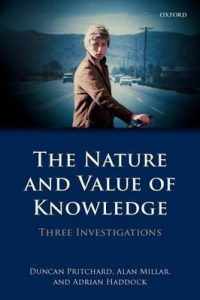
3:AM: Why do you say it’s a live option?
DP:The driving methodology of Epistemological Disjunctivismis threefold. First, show that the view is rooted in our everyday practices. Second, show that the view has philosophicaladvantages, such that we would desire such a view, if it were available (i.e., because it can help us deal with important philosophical problems, such as radical scepticism). Third, that such a view is available since, without citing any additional philosophical thesesthat would be otherwise contentious, it is a live option in that the putative problems facing the view are shown to be illusory. This third aspect of the methodology of Epistemological Disjunctivismis the most relevant here. In Epistemic AngstI tell what I think is the complete story about the (Cartesian) sceptical problem, but that requires me to bring in the Wittgensteinian account of hinge commitments. In Epistemological Disjunctivism, my goal was to show that epistemological disjunctivism can do the work that it needs to do regardless of having support from other theses. (The reason I did this, by the way⎯and this is also the reason why Epistemological Disjunctivismis such a short book⎯is that if you want to argue for an iconoclastic position then it’s really important that the book is both short (no-one will bother to read it otherwise) and that it doesn’t appeal to theses that are independently thought contentious (as then the book will be summarily discounted in virtue of trading on these independently contentious theses)).
3:AM: Why are neo-Mooreanism and McDowellian responses to scepticism again important in this? What exactly are you taking from McDowell in this as it’s notoriously difficult to find consensus about his epistemologicalviews isn’t it?
DP:You’re right that McDowell is not well understood in contemporary epistemology—indeed, I think he has been systematically misunderstood (even by sympathetic interpreters, like Brandom). While a brilliant and original thinker, McDowell is not always the clearest writer. My goal was to introduce his ideas to contemporary epistemologists in terms that they would understand, and in doing so show the plausibility of these ideas. If you only depend on epistemological disjunctivism to deal with radical scepticism then you end up with a new kind of neo-Mooreanism, which maintains that one can know that one is not the victim of a radical sceptical scenario on the basis of factive, reflective accessible, grounds. I think such a view is defensible⎯indeed, I defend such a position in Epistemological Disjunctivism⎯but I don’t think it’s ultimately the right way of dealing with the problem of radical scepticism. As I explain inEpistemic Angst, this problem is in fact two logically distinct problems masquerading as a single difficulty. This is why we need a two-pronged⎯or biscopic⎯treatment of the problem, where epistemological disjunctivism is just one aspect of the solution. (It was important in Epistemological Disjunctivismnot to bring the second aspect of the solution to bear, as remember the methodology of that book was precisely not to adduce any other philosophical theses that were independently contentious, given that epistemological disjunctivism was at that point held to be wildly implausible).
3:AM: You’ve returned since your epistemic luck book to look at radical scepticism in your book Epistemic Angsthaven’t you? And out of your work on disjunctivism you’ve come to realize that there are two formulations of radical scepticism that are coming from different sources. Can you say something about this and why this bifurcation is important?
DP:The problem of radical scepticism is usually formulated in terms of a closure-style principle, but sometimes it is also formulated in terms of an underdetermination principle. The standard line was that these two formulations are effectively equivalent, at least to the extent that what differences there are aren’t philosophically interesting. In an early paper⎯‘The Structure of Sceptical Arguments’, Philosophical Quarterly55 (2005), 37-52⎯I’d argued that the standard line was wrong, and that there were important logical differences between these two formulations. One of the main claims of Epistemic Angstis that these two formulations need to be kept apart since they each trade on (what I term) a distinct source of scepticism. In particular, I think that the underdetermination-based formulation is trading on what I call the insularity of reasons, which is the claim that the rational support our beliefs enjoy, even in the very best cases, is always compatible with the widespread falsity of our beliefs. In contrast, I claim that the closure-based formulation is trading on a distinct claim I call the universality of rational evaluation, which is the idea that there are no in principle restrictions on the scope of rational evaluations. I maintain that both of these theses, while superficially plausible, are false. Moreover, I claim that they are not theses that are rooted in our everyday epistemic practices, but rather theoretical claims. This is important to my claim that what I am offering in rejecting these sources of scepticism is an undercutting, rather than overriding, response to the problem.
3:AM: How does Wittgenstein help you not just with the underdetermination-based kind of scepticism that disjunctivism dealt with but also closure-based formulations of scepticism? (And I guess it would be helpful to quickly sketch what each of these technical terms means first.)
DP:I don’t think the account of the structure of rational evaluation that I claim can be extracted from Wittgenstein’s On Certaintyhas any application to underdetermination-based scepticism. Rather, it helps us deal with closure-based radical scepticism by helping us to understand why there are principled limits on the scope of rational evaluation. In particular, once we understand that it is in the nature of rational evaluation that it takes place relative to a backdrop of visceral, arational hinge commitments, then we also thereby understand why the kinds of universal rational evaluations that the radical sceptic attempts are simply incoherent. Epistemological disjunctivism, in contrast, is the antidote to underdetermination-based radical scepticism, by getting us to see that the rational support our beliefs enjoy in the best cases is far superior to what they enjoy in analogous cases where things go epistemically awry. In particular, since we can have factive reasons in the best case, so the insularity of reasons thesis is false.
The big innovation of the book is to show how these two very different anti-sceptical proposals⎯which have hitherto been treated as competing anti-sceptical views⎯are in fact not only compatible with each other, but also mutually supporting and entered in the same undercutting philosophical spirit. For example, I argue that it is much easier to live with the idea of factive rational support if one combines this view with a Wittgensteinian account of the structure of rational evaluation, and it is also much easier to embrace a Wittgensteinian account of the structure of rational evaluation if one is also able to contend that some of one’s reasons are factive. (Why is my proposal ‘biscopic’? It’s an ugly term, I grant, but it does convey just what I’m after, which is basically that we’ve been viewing the problem of radical scepticism hitherto through one eye at a time, and so missed its dual structure, which we can now see clearly through both eyes).
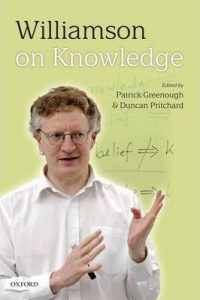
3:AM:Now one of the big ideas in epistemology over the last thirty or so years is Williamson’sknowledge first approach. Can you sketch for us what this approach consists of and why it has been such a game changer for epistemology?
DP:Knowledge and It’s Limitsis a fantastic book, a real tour de force. But if I’m honest, it hasn’t influenced me all that much. I think this is likely because I’d already developed my epistemological views when I read that book. In any case, I think it is for others, who endorse the K-first approach, to set out what it amounts to (beyond the basic idea that knowledge plays some sort of fundamental, primitive role). (Incidentally, I think that my anti-luck/risk virtue epistemology is entirely compatible with the core thesis for knowledge-first epistemology by the way, in that I don’t see this proposal as being committed to a reductive analysis of knowledge, though it is perhaps not consistent with the overarching ideas behind this research programme. But that’s ultimately a judgement call that only someone who backs K-first epistemology can make).
3:AM: Has Williamson’sapproach – in particular his ideasregarding luminosity - fed into your own work regarding scepticism?
DP:There are some overlaps between our views, and sometimes you find commentators (like Tony Brueckner, in one his last papers) lumping our anti-sceptical stances together. But I think the differences are so significant that it’s better to just to keep them apart. In particular, the guiding lights for my anti-scepticism are Wittgensteinand McDowell (with possibly John Henry Newman lurking in the background), and I very much doubt that this is true for Tim!
3:AM: How do you respond to those who wonder whether philosophy questions can ever be really answered once and for all and who therefore conclude it’s a waste of time? No matter how good an argument for a position there always seems to be the philosopher who later challenges it. Philosophical questions never seem to die. How do you defend philosophy against these skeptics?
DP:The best way to respond is to actually solve some problems. I think I have done that. In particular, I think that my anti-luck/risk virtue epistemology really does offer a philosophically satisfying complete account of knowledge (and much more besides, such as casting light on how knowledge relates to other epistemic standings like understanding). And I think I have also solved the problem of radical scepticism, at least in one of its most influential guises anyway. Of course, a lot may hang on your phrase ‘once and for all’, as in writing the foregoing I am obviously not suggesting that debate about these topics will end as a result of my contributions! I do get e-mails from time-to-time from philosophers who have read either proposal and found it compelling as a solution to the problem in hand, but I also get far more correspondence from philosophers that is critical of my views. That’s to be expected. The point, however, is to find solutions that one finds philosophically satisfying, and to articular them and defend them as clearly and openly as you can; you can’t do anything else beyond that.
(Incidentally, I can’t help but relate a funny anecdote at the point. I have a philosopher friend⎯I won’t name him⎯who had this recurring dream in which he was delivering a philosophy talk that solved all the major philosophical problems at once. When his talk was finished initially there was silence. But then the crowd erupts in joyous clapping, a standing ovation, and cries of ‘Oh my gosh, he’s really done it!’, and so forth. He is carried from the room by the jubilant crowd. Of course, he never remembers a word of what he says in that talk. The dream is funny precisely because it depicts a scenario that’s completely preposterous).
3:AM: And for the readers here at 3:AM, are there four books that you could recommend that will take us further into your philosophical world?
DP:In no particular order (I’m assuming here that people have read the relevant classics, like Wittgenstein’s On Certainty, or at least that they don’t need any recommendation from me):
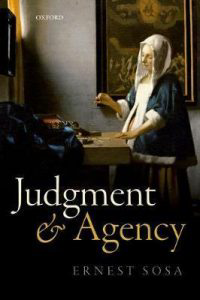
Anything by Ernest Sosa(but if you want to keep me to one book, make it his latest, Judgement and Agency)
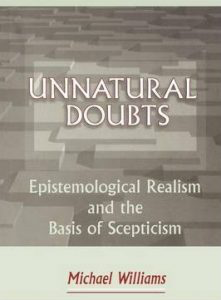
Michael Williams, Unnatural Doubts
Linda Zagzebski, Virtues of the Mind
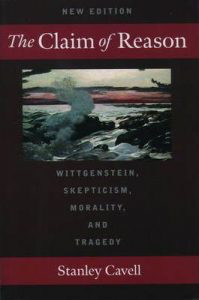
Stanley Cavell, The Claim of Reason
I should say, incidentally, that I disagree with all these works, but that’s the way of things. I’d also like to mention Dretske and Davidson. Their papers are uniformly great. Dretske, of course, also wrote some fantastic books, but I really think that, like Davidson, he shined most brightly when he was writing papers, so I urge readers to check these authors out. This is especially so because they are philosophers who I can see are being forgotten, but they don’t deserve to be.
A coda on Cavell, if I may. I’d also urge your readers to check out his incredible discussions of key Shakespeare plays, and also his amazing work on the screwball comedies of the 1930s and 40s⎯His Girl Friday, The Philadelphia Story, and so on (films that I simply adore). Like Davidson, and to a lesser extent Dretske, Cavell seems to be completely ignored these days, and yet he had one of the most inventive philosophical minds of the last hundred years.

ABOUT THE INTERVIEWER
Richard Marshallis still biding his time.
Buy his new book hereor his first book hereto keep him biding!
End Times Series: the first 302